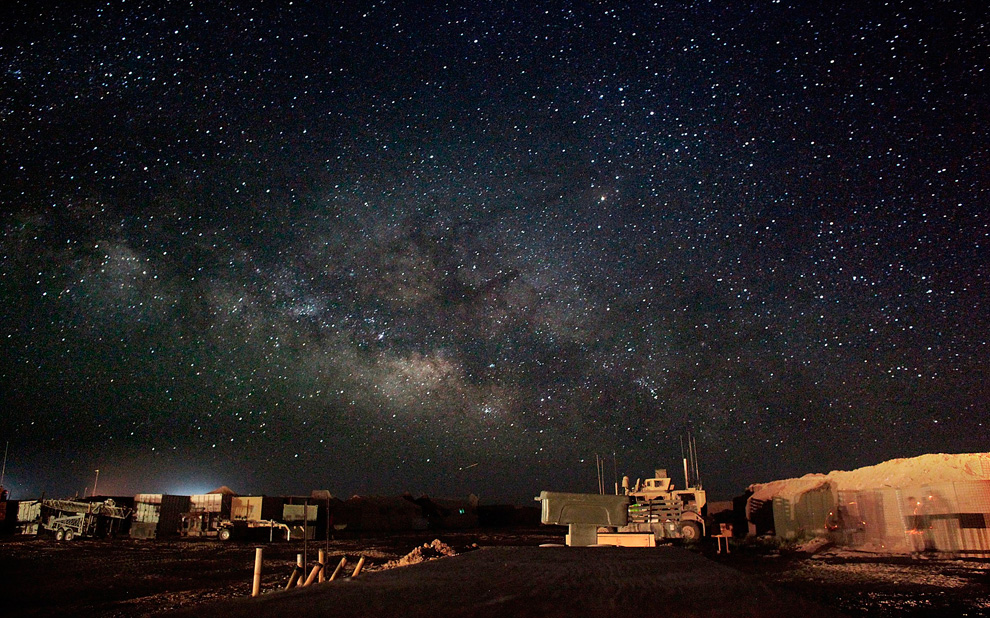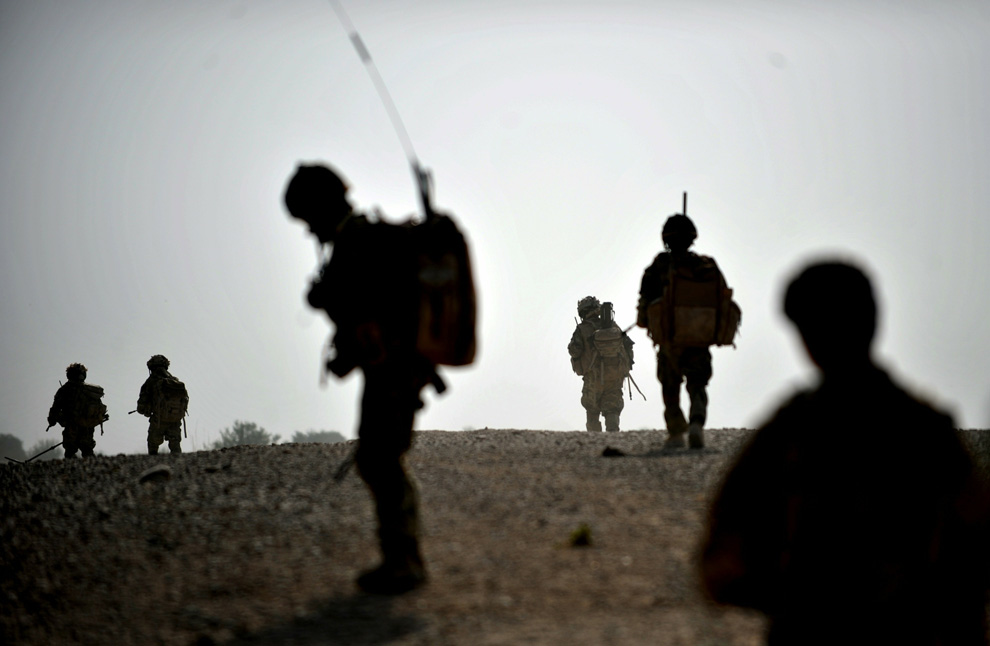Guest Post by Jeremy Gordon
In his recent post Mythic Vision in Afghanistan, Robert Hariman writes that in the face of “enormous organizational and technological power,” unseen enemies, non-identifiable strategy, unknown objectives, and forces beyond the scope of certainty, photographers have tapped into mythic visions of combat in Afghanistan and Iraq.
After reading Hariman’s optical shift to science fiction I was reminded of a Star Trek episode where Captain Kirk and crew come across the ancient Greek god Apollo, who has been waiting for humans to believe in him again. With faith in their technology and rational systems of knowledge production, Kirk and crew resist. They spend the episode tearing Apollo down and so he retreats to the stars with all of the other disregarded gods, most likely taking cover as constellations, as seen here:

There are complex themes to be explored by looking at these images with a mythic vision, reflective of a much more complex tension between men and gods (gods here being the virtues and vices of human behavior, unseen forces of contingency, paradox, luck, and chance). Mythic vision invites various poetic optics through which scenes from Afghanistan are not overshadowed by the instrumental laws of efficiency and technology championed by Captain Kirk.
For instance, as the scene from a Greek tragedy, we might imagine Ares brewing a storm over the camp, and that Aphrodite, the goddess of beauty, is part of the charge. We see all the armor and firepower Hephaestus, the god of fire who armed Achilles with his shield, has fashioned. But rather than being captivated by the tools at our disposal, the Humvees and desert camouflage give way in looking elsewhere to understand what the scene is about, the unseen actors who were always offstage in ancient tragedy. The encampment is silent and, as warriors hide amongst their vessels, we can see the gods, or what is left of them, watching, waiting to play their hands. What is telling about this image of the Cosmos, and Kirk’s denial, is that what awaits us in the future, is what we have left in the past, the faith in gods and understanding that forces beyond our control make moments of domination and victory fleeting. Using such a tragic optic urges us to look beyond the horizons to corners and edges, to the apparitions that induce us to question if we saw Ares in the .50 caliber round that accidentally discharged, killing a warrior at point blank range? Was that whisper in the wind the just goddess of war Athene, who blew sand away from a hidden IED?
Recognizing gods requires looking beyond the earthly horizon.

The desolation wreaks of endlessness, but the trees blurred and dusted by the winds of the desert emphasize a destination, perhaps the River Acheron, the crossing point at which spirits move to the underworld. What of the warrior illuminated in dusty green among the shadows? Is he walking amongst the dead, following and being driven by ancestors? Are the shadows Hermes like figures? Hermes protects travelers and looks after boundaries, especially the one between the land of the living and the dead. Hades’ presence is strong here, as the ground seems to swirl and blur beneath their feet. The glare is stark and suffocating, and there is no telling what is beyond the horizon for the warrior still in color, but we can guess that violent contingencies may deny him the protection offered by body armor and firepower. We see a spark of chance, a whisper of hidden secrets, and a hint of mysterious experiences in which the difference between technology and the Cosmos is not so clear.
If Kirk is right and we have outgrown the gods, is it any wonder warriors are instrumentalized to the point where war becomes merely an extreme sport? An ode to Achilles’ mastery of killing, as an extreme athlete? Is it a surprise that we fail to recognize Hypnos and Thanatos on the heels of these “athletes?” When we outgrow the gods, we fail to grasp the tragic laws in the poetics of the ancient deities, always present but incognito, laying in wait only to sneak back into the rational world of warfare as violent epiphanies, even if present only for a moment, which is forever.
Photographs by Hyunsoo Leo Kim/AP/The Virginian-Pilot and Bay Ismoyo/AFP-Getty Images, thanks to The Big Picture. Jeremy Gordon is a PhD student in Communication and Culture at Indiana University-Bloomington who pays homage to (and is repulsed by) the gods of war, rhetoric, theatre, and myth. He can be contacted at jeregord@indiana.edu.
Yes, true enough, we haven’t outgrown the gods, but we have misimagined ourselves — as the blind poet Nixon might have said — into technological illusion. The photo ‘Afghan night, stars’ is easy enough to read as the Argives camped on the beach near Troy, and the photo ‘Afghan patrol, Gurkhas’ as a moment in a war of many years. From time to time, at key moments, this goddess or that moves among the the kings/generals, shadowing their minds.